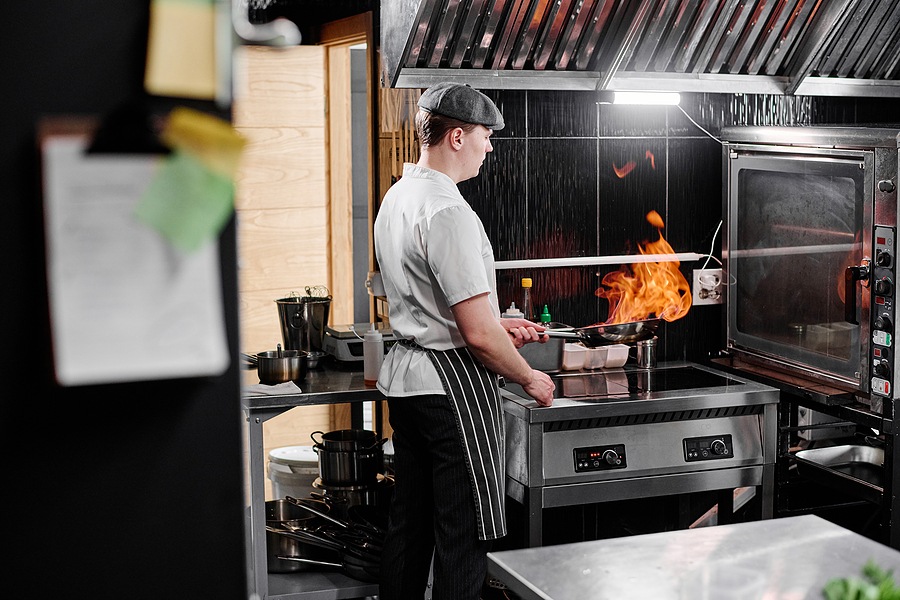Are you struggling to keep great workers at your restaurant? If so, you aren’t alone. Staffing has become a huge challenge in the food service industry lately. It’s very difficult to attract and retain enough staff.
Losing good staff members is scary. But you know what’s even scarier for them? An unsafe commercial kitchen. Make safety a top priority. Show your staff you care. Here are 10 tips to transform your Albuquerque kitchen into a safer place to work:
1. Require Proper Work Clothes
Don’t allow employees to wear baggy pants or clothes that could cause tripping and falls. Insist on neat, well-fitting clothes that don’t leave too much skin exposed. Closed-toe, non-slip shoes are an absolute must-have for safety. Consider providing staff with kitchen uniforms if you want a consistent look.
2. Train Staff on Proper Communication
Busy commercial kitchens can easily lead to collisions between staff if they aren’t communicating properly. Teach employees to say “behind” or “coming through” whenever they’re approaching someone from behind. This simple warning prevents dangerous crashes. Collisions are especially hazardous if one person is holding a sharp knife or carrying a pot of boiling hot liquid. Clear communication prevents serious kitchen injuries.
3. Install Non-Slip Floor Mats
Kitchen staff often has to move very quickly in tight spaces. Greasy floors can cause painful and dangerous slips. Reduce the likelihood of falls by installing non-slip mats in all high-traffic areas. According to the Bureau of Labor Statistics, 849 American workers across all industries died in 2016 from preventable trips, slips, and falls. Do your part to protect your hardworking staff.
4. Use Equipment Guards
In the midst of a hectic lunch or dinner rush, it’s easy to momentarily forget safety best practices. Equipment guards serve as an extra precaution to prevent lingering injuries caused by that split-second lack of attention. Even your most experienced, safety-conscious employees can make mistakes when they’re rushed. Guards reduce harm when focus slips.
5. Ensure Proper Ventilation
The kitchen environment can quickly become uncomfortably hot and smokey if ventilation is inadequate. You don’t want employees getting dizzy and doing a faceplant onto the flat top grill! Breathing smoke-filled air all day long can also cause or worsen chronic breathing issues and lung disease. Maintain strong exhaust fans and vents. Bring in plenty of fresh air. Keep temperatures at a safe level.
6. Listen Closely to Staff Safety Concerns
Your employees are the ones actually working in the kitchen day in and day out. They’re most likely to notice potential dangers first. If a staff member points out a cracked shelf or frayed electrical cord, don’t wait for it to collapse and cause an injury before taking action. Fix safety issues right away. You’ll not only prevent accidents, but also show employees you genuinely care. This boosts morale and makes them want to stick around.
7. Immediately Clean Up Spills
Be sure to immediately clean up any water, grease or food spills on the floor. Use highly visible warning signs to alert staff to the slick area. Verbally inform all employees to use extra caution around the spill. Never try to clean up broken glass, crockery or utensils by hand – serious lacerations can result. Always use a broom and dustpan. Remove hazards quickly.
8. Take Steps to Prevent Cuts and Burns
Keep kitchen knives professionally sharpened for safety and efficiency. Provide staff with cut-resistant gloves and non-slip cutting boards. Train employees on proper knife handling techniques to reduce hand injuries. Give workers high-quality, long-cuffed oven mitts and potholders. Replace them frequently so they remain protective. Taking these steps helps avoid painful and preventable kitchen injuries.
9. Watch Out for Electrical Dangers
Routinely check electrical cords on appliances for any damage like fraying or exposed wires. Stop using appliances immediately if the cord shows wear, and replace the cord before using again. Also be vigilant about keeping electrical appliances and cords away from water and other liquids to prevent shocks and electrical fires.
10. Practice Regular Fire Safety Drills
The kitchen environment, whether residential or commercial, is the most common place for fires to start. Your staff needs to feel completely confident that they know exactly what to do in case of a real kitchen fire. Schedule a paid training day with your local fire department prevention officer to give employees proper instruction. Follow up with frequent fire drills to ensure they remember emergency procedures. Practicing boosts safety skills and readiness.
Show Employees You Care Deeply About Their Safety
Workers who believe you are doing absolutely everything possible to ensure their safety and wellbeing are far more likely to join your kitchen staff and stay loyal to your restaurant long-term. A visibly safe workspace and caring management boost morale, increase productivity, and reduce the chances of injuries. That’s a win-win situation benefiting both staff and owners! Make safety your top priority starting today.
